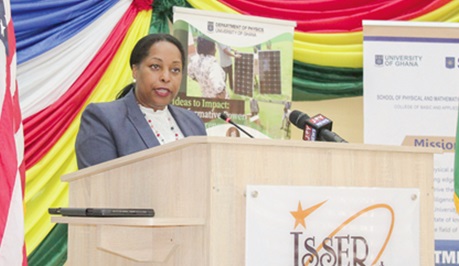
US helping Ghana to tackle poor air quality
Poor air quality causes 28,000 premature deaths in Ghana every year, according to statistics from the World Health Organisation (WHO).
This is mainly caused by the effect of the use of wood and charcoal for cooking, road transport emission, slash-and-burn methods of farming and open waste burning.
The acting United States Assistant Secretary of State for Oceans and International Environmental and Scientific Affairs, Jennifer R. Littlejohn, who shared the data, said her country was concerned about the statistics and was keen to help to improve the situation.
Not only that, her country was also investing and supporting interventions intended to help alleviate the impact climate change was having on agriculture, the environment and general hygiene.
Help
Speaking during a public lecture at the University of Ghana, the American diplomat said the United States Government has as part of its larger objective to increase regional capacity and cooperation funded a week-long certificate programme at the UG to help build capacity and increase regional capacity and cooperation on improving air quality.
The programme, she said, educated 100 participants from across West Africa on air quality topics while forming a community of practice for scientists, health experts, and governments throughout the region.
She noted that the US Government expected to grow the hub at the UG to become a "regional training centre for air quality and then replicate this model to create additional hubs throughout the continent."
Investment cooperation
In other interventions, Ms Littlejohn said the US Government, through the Millennium Challenge Corporation, had so far invested US$10 billion on the continent, including two compacts with Ghana which were focused on agriculture and energy critical to adaptation to climate change.

She noted the US through the USAID invested a total of about US$150 million per year, focusing on projects like clean water, agricultural support, public health, and basic education.
Additionally, the USAID will invest approximately US$100 million in Ghana’s water, sanitation, and hygiene (WASH) sector over the next five years.
This investment is expected to provide potable water services to one million Ghanaians that currently do not have access to water, she stated.
Again, the USAID is providing US$23.8 million in Ghana over five years to reduce fishing overcapacity and improve fisheries management by focusing on small fishing villages and fish landing sites along the coasts.
This investment will also address the concerns of illegal, unreported and unregulated (IUU) fishing which is very rife in the Gulf of Guinea.
Apart from that, US Assistant Secretary of State for Oceans and International Environmental and Scientific Affairs indicated that the US State Department, in partnership with Ghana’s Centre for Maritime Law & Security and the University of Cape Coast Centre for Coastal Management, had launched a US$1 million project to promote transparency, accountability, and local capacity to address the destabilising impacts of foreign distant water fishing vessels.
Hope
Ms Littlejohn said though the United Nations had projected that more than half of global population growth by 2050 would come from sub-saharan Africa, a situation which might come with tremendous challenges for development growth.
“For development growth, this is quite challenging for the continent, but this statistic also means the world’s future will look a lot more African, and that Africa, with the right training and education, will have enormous wealth in human resources which can be an asset for development,” she stated.
